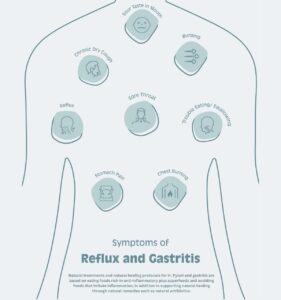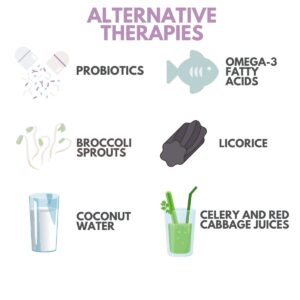Blog
Natural Treatments for Helicobacter Pylori
Gastritis is a digestive condition resulting from damage and inflammation of the mucous membrane lining the stomach and gastrointestinal tract. The stomach contains an inner lining known as the mucous membrane, which consists of several layers of different cells. These cells secrete hydrochloric acid and various digestive enzymes essential for digesting food materials such as pepsin. When the mucous membrane is exposed to irritating factors, white blood cells accumulate in it, leading to a condition known as gastritis.
Gastritis is characterized by the erosion of the stomach lining due to exposure to acid and other digestive enzymes. This condition is marked by a burning sensation and severe pain in the digestive system along with many other bothersome symptoms, and sometimes poor absorption of nutrients such as vitamins and iron.
Helicobacter pylori infections are the most common causes of gastritis. The Helicobacter pylori is a bacterium that affects 80% of people worldwide, but fortunately, 80% of those do not experience symptoms, meaning the inflammation is silent. However, in some special cases, the Helicobacter pylori can penetrate the mucous membrane and cause acute inflammation, which over time can lead to stomach ulcers and stomach cancer.
Diet plays a significant role in the development and treatment of gastritis, as healthy lifestyle changes and dietary adjustments can greatly alleviate symptoms and improve digestive health.
What Causes Acute Gastritis and Stomach Acidity Problems?
Gastritis is a condition characterized by inflammation of the stomach lining and erosion of its protective barrier. This condition develops due to multiple factors affecting mucus production and exposing the stomach to acid damage. Several factors lead to decreased mucus production and increased inflammation in the stomach:
- Medications: Excessive use of nonsteroidal anti-inflammatory drugs (NSAIDs) and painkillers, including overuse of ibuprofen and reliance on aspirin, can irritate the stomach lining. It is advised to consult a doctor before discontinuing any medication.
- Caffeine: Drinking more than two cups of coffee daily can make the stomach lining sensitive, as excessive caffeine use reduces stomach acid and diminishes the protective mucus layer, making it prone to acute inflammation.
- Poor Dietary Habits: Relying on ready-made foods filled with preservatives, hydrogenated fats, flavor enhancers, and processed foods in general increases the risk of chronic gastritis. These include canned foods, frozen foods, chilled and processed meats such as hot dogs and salami, and packaged foods. Additionally, overeating and consuming hard-to-digest foods late at night, especially proteins like chicken and meats, can worsen symptoms.
- Deficiency in Essential Nutrients: A deficiency in zinc and important minerals like magnesium, sodium, and selenium leads to weakened stomach acid, increasing the risk of bacterial infections.
- Obesity: Being overweight can exacerbate gastritis symptoms.
- Infections: Infections caused by Helicobacter pylori or other bacteria, viruses, and fungi can damage the stomach lining.
Risk factors of Helicobacter pylori Infection?

The Helicobacter pylori, is one of the common germs causing acute gastritis. Although 80% of Helicobacter pylori infections are asymptomatic and do not lead to severe complications, certain factors can exacerbate the infection and convert it to a symptomatic infection with possibly some complications. These factors are:
- Weak Immunity: Individuals with a weakened immune system are more susceptible to complications from Helicobacter pylori.
- Excessive Alcohol, Smoking, and Caffeine Consumption: These habits negatively affect the stomach lining, making it more prone to infections by reducing stomach acid, which normally disinfects the stomach. When stomach acid is low, the Helicobacter pylori take advantage of this and penetrates the inner lining, causing inflammation.
- Weak Stomach Acid: The weaker the stomach acid, the stronger the Helicobacter pylori becomes and more capable of penetrating the stomach lining, causing gastritis.
- Contact with Infected Individuals: Exposure to people infected with the Helicobacter pylori increases the risk of transmission. The infection can be spread through direct contact, such as sharing utensils or cups without proper washing.
- Stress: High stress levels can contribute to the development of gastritis.
Understanding these factors and addressing them through lifestyle and dietary changes can help manage and prevent gastritis.
Diagnosis of Gastritis or Helicobacter pylori:
Laboratory tests that Dr. Fajer might request depend on your age, weight, height, and medical history and may include:
- Blood tests
- Stool tests
- Breath test for detecting Helicobacter pylori
- Endoscopic examination: Gastroenterologists diagnose gastritis by performing an endoscopy to examine the stomach lining for signs of inflammation, such as increased white blood cells, redness, swelling, bleeding, or small erosions.
If you suspect you have gastritis due to stomach pain, it is essential to see a doctor for tests to confirm the diagnosis. Once diagnosed, acute gastritis symptoms often improve quickly with lifestyle and dietary changes.
Symptoms of Gastritis and Helicobacter pylori infection:

- Epigastric pain
- Reflux and heart burn
- Nausea or vomiting
- Loss of appetite, feeling full quickly, and possibly weight loss
- Hiccups and belching
- Excessive bloating and poor digestion: the problem of gastritis and H. Pylori is always associated with a weak stomach acid and digestive enzymes deficiency, as a consequence food is not properly digested and it will end up being fermented by the gut bad bacteria; therefore, producing a lot of gases and bloating. This condition with time is known as SIBO.
- Poor digestion can also lead to poor absorption of essential vitamins and minerals.
Complications of Untreated Gastritis and Helicobacter pylori infection:

Chronic untreated gastritis and Helicobacter pylori can lead to complications such as:
- Severe stomach bleeding
- Stomach ulcers that can cause bleeding
- Stomach ulcers that may lead to stomach cancer in the future
- Severe anemia
Natural Treatment for Gastritis and Helicobacter pylori:
- Lifestyle Tips:
- Organize Meals: Divide your meals into multiple small portions throughout the day and avoid eating after 7-8 pm.
- Manage Acid Reflux: If you suffer from acid reflux, elevate the head of your bed by 45 degrees during sleep.
- Proper Chewing: Chew food well before swallowing, and avoid large quantities in one meal.
- Reduce Irritants: Limit coffee consumption or replace it with sage or fennel tea, and avoid smoking.
- Reduce Stress: Minimize stress, which affects immunity and stomach secretions.
- Healthy Lifestyle: Get enough sleep, exercise, drink sufficient water, enjoy favorite hobbies, and practice meditation.
- Dietary Recommendations:

Allowed Foods:
Probiotics: Such as coconut yogurt and Japanese miso.
Omega-3
Nutrients: make sure to consume healthy protein option like fish, chicken and legume such as red lentils, healthy fat like avocado, nut butter and olive oil. Focus on anti-inflammatory foods like various vegetables and fruits.
Superfoods: For more information on superfoods that help heal Helicobacter pylori and gastritis, please refer to the natural healing protocol for H. Pylori and gastritis that Dr. Fajer have used to treat thousands of clients around the world to recover from gastritis and H. Pylori.For more information. click the following link:
https://drfajeraljumairi.com/ar/digestive-health/reflux-and-gastritis-protocol/
Forbidden Foods:
Preservatives and hydrogenated fats
Irritating foods
Fried foods
Inflammatory foods: Dairy products, gluten, hydrogenated fats, sugar, processed products
Spicy seasonings and hot chili
- Supplements and Natural Remedies for Helicobacter pylori infection and Gastritis:

Such as mastic gum, black seed oil, fresh turmeric, ginger, and licorice tea. These supplements can help eliminate Helicobacter pylori within 6-8 weeks. For more information on superfoods that help heal Helicobacter pylori and gastritis, please refer to the natural healing protocol for H. Pylori and gastritis that Dr. Fajer have used to treat thousands of clients around the world to recover from gastritis and H. Pylori. For more information, click the following link:
https://drfajeraljumairi.com/ar/digestive-health/reflux-and-gastritis-protocol/
Conventional Treatment:
Conventional treatment for gastritis and stomach ulcers involves the use of very strong medications, such as three types of strong antibiotics and one type of proton pump inhibitor like omeprazole, Nexium, or pantoprazole. These medications should be used for a limited period under medical supervision, usually ranging from one to two months, especially if the patient has severe stomach ulcers or acute gastritis that has not responded to natural treatments. Long-term use of these medications can significantly reduce stomach acidity, causing poor digestion, bloating, gas, and poor absorption of vitamins and minerals, especially Vitamin B12. It is essential not to stop these medications abruptly without medical supervision, as this can lead to increased reflux and stomach acidity due to increased gastrin hormone secretion.
Note: Most conventional treatments are very harsh on the stomach and colon, which is why Dr. Fajer Al Jumairi does not recommend them as the first line of defense. 99% of people who follow conventional treatment will suffer from post-treatment IBS-like syndrome, characterized by bloating, gas, cramps, and bowel movement disorders (SIBO and irritable bowel syndrome).
To learn more about natural treatments for helicobacter pylori, please refer to Dr. Fajer Aljumairi YouTube channel and watch this episode:

